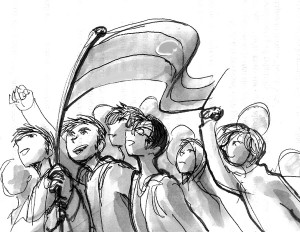Alliances can defeat the Libyan authority
The Libyan uprising is turning into a humanitarian crisis.
Colonel Muammar Gaddafi has attacked protestors with a relentless fury to hold onto his power.
The international powers have not done enough to end this crisis.
The United States has imposed severe sanctions on Gaddafi’s regime, frozen $30 billion in Libyan assets, moved naval and air forces closer to Libya and sent two humanitarian teams to the Middle East to aid the refugees who have been displaced as a result of the bloodshed.
The European Union issued travel bans to Libyan leaders and the Gaddafi family and proposed a 60-day economic embargo on the regime to prevent Gaddafi from using oil and other revenue to repress his people.
The United Nations has also sanctioned the Gaddafi regime, imposed an arms embargo on Libya, frozen the assets of its leaders, referred the case to the International Criminal Court’s lead Prosecutor for possible crimes against humanity and, most recently, suspended Libya from the U.N. Human Rights Council.
Unfortunately, these measures take time to have a real effect — time the Libyan people are quickly running out of.
The death toll in Libya remains unconfirmed, but the estimates are around 1,000 people. And Tuesday, the U.N. Refugee Agency reported that 140,000 people fled Libya to Egypt and Tunisia.
On Monday, U.N. Secretary-General Ban Ki-moon emphatically urged the world to act against the repressive Libyan regime, as “history’s most tragic chapters are written when we fail to heed that call. Let us not fall short.”
That action needs to come from multiple sources, and students are a viable group to begin the dialogue.
As students, we should condemn leaders who use deadly force against their own people.
A widespread rally or a mass protest on university campuses across the nation would send a message to politicians and leaders.
Student action is crucial to spurring worldwide reaction to the Libyan uprising. Hopefully, it can help begin the process of deposing Gaddafi.
The U.N. can lack international authority because U.N.-led action depends on the solidarity and cooperation between, at the very least, the permanent members of the U.N. Security Council.
On the other hand, U.N.-led action would be extremely effective and pragmatic if the members of the Security Council can agree on a stronger response to Gaddafi.
It might be impossible to coalesce countries on the Security Council like Russia and China into escalating their response.
Russia supports the U.N. sanctions against Libya although it could lose up to $4 billion in arms trade with Libya. But on Wednesday, Russian Foreign Minister Sergei Lavrov condemned the idea of implementing a no-fly zone over Libya.
China, which recently succeeded in evacuating 35,000 Chinese nationals working in Libya, has commonly turned a blind eye to human rights abuses in its interactions with foreign countries, especially in the Middle East and Africa.
It would be surprising if China committed its military to the defense of foreign citizens.
Getting Russia and China to agree to a multilateral response that includes military involvement might be what’s necessary to simultaneously stop the humanitarian crisis limitations.
The international community needs to mount a stronger response to Gaddafi.
Imposing a no-fly zone could be an effective measure to stop Gaddafi from attacking his people.
Enlisting regional organizations in Africa and the Middle East, such as the African Union or the Arab League, to aid the situation would also uproot the notion that western democracies are manipulating the Libyan crisis.
Having said this, neither the U.N. nor the United States can rebuild Libya.
That burden rests solely on the shoulders of the Libyan people, but it is still our responsibility to help them.
William Fay is a senior majoring in international relations. His column, “Facing Our Global Challenges,” runs every other Thursday.
Click here to see what students had to say about the Libyan crisis.


I wonder if this is like the alliance that invaded Afghanistan, oh so many years ago? Lot of good that has done, eh?